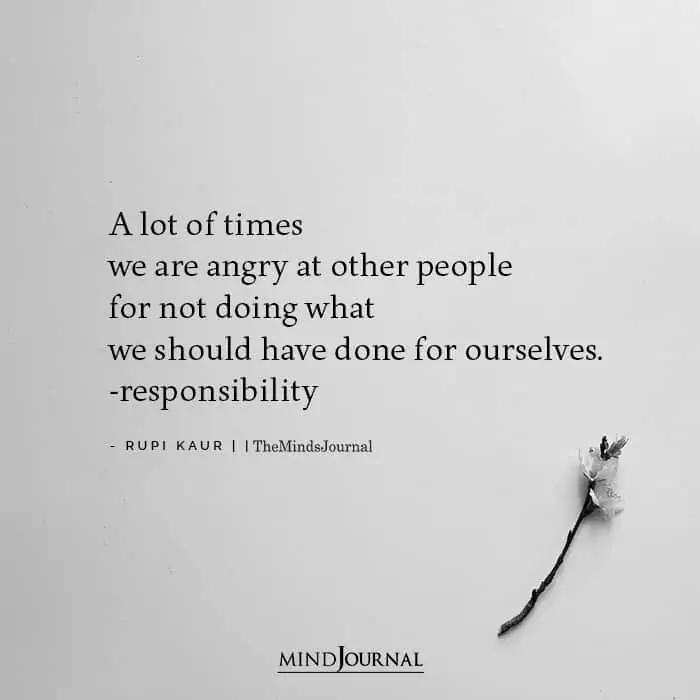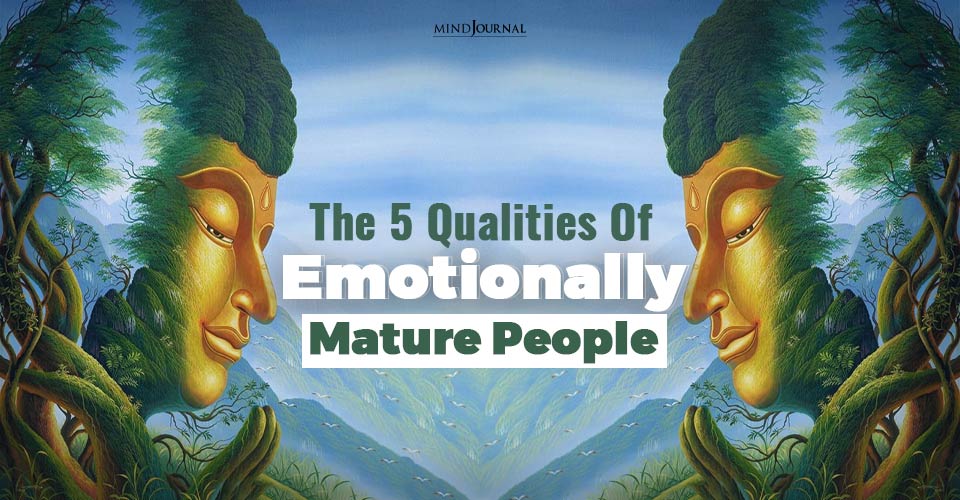Do you think you’re emotionally mature? There are a few qualities or traits, if you may, that separate emotionally mature people from the not-so emotionally mature ones. Read on to know the qualities of emotionally mature people and if you are the one.
A few years ago, we had a falling out with my grandfather.
Sadly, my grandma died fairly young. Lung cancer. 2008. After her death, my grandpa started “acting out” — or at least that’s what a parent might say.
Before he retired, my grandfather was an architect and a very successful one at that. Since grandma died, however, my grandpa has been “spending the money with both hands,” as we say in Germany. Trying to fill a void that can’t be filled, he buys cars, art, and expensive clothes. He takes fancy vacations, eats out a lot, and dates women half his age who only care about his money.
He’s also completely retreated from family activities. He bailed on my sister’s concert once — before it was her turn to sing. He never shows up at our house anymore. He’s angry, erratic, and scares everyone away, even his friends.
Now, my grandpa was always a bit difficult, but I also remember him as a generous, funny, interesting man. He always had good taste, hosted great parties, and told jokes about everything. Unfortunately, that man seems gone.
Next to my aunt, I was among the last to visit him before he stopped talking to us altogether. In the end, what shocked me the most was his utter lack of perspective. He was unable to see anyone else’s point of view, and that’s why he now spends most of his time alone.
My grandpa never grew up. He is a 4-year-old child inside the body of a 79-year-old man. What my grandpa is missing — and what my grandma used to compensate for all these years — is emotional maturity.
Unlike physical development, emotional ripeness isn’t something we pick up naturally. We have to cultivate it. When children throw a hissy fit, we show them how to calm down, manage their ego, and put their emotions in context. When an old man does the same, we shake our heads in disbelief — he should have learned to process his feelings ages ago. The truth, however, is that many people don’t, and some, like my grandfather, never do.
At nearly 80 years old, I’m not holding my breath waiting for my grandpa to come around. Hope dies last, but for now, I think the best you and I can do is to learn from his mistakes. I’m only 28, but, next to observing him, I’ve also spent the last few years studying emotions in myself and others.
Here are five qualities I continue to see in those I’d call emotionally mature.
Related: 13 Things Emotionally Mature Men Do Differently
The 5 Qualities Of Emotionally Mature People
1. They Don’t Run Away
Most of our challenges today are emotional challenges. It’s not that you faint when giving a presentation to the higher-ups or that your heart stops pumping blood when your girlfriend breaks up with you — it’s that the prospect of these events conjures a plethora of difficult emotions, and those emotions make you want to escape. Emotionally mature people resist this urge.
Instead of running away and hiding, whether that’s leaving a physical location or drowning their discomfort in distractions like alcohol or entertainment, emotionally mature people sit with their pain. They stay with the discomfort until they’re able to identify their emotions. Psychologist Nick Wignall calls this emotional tolerance, and meditation is one of its key enablers.
None of us control our impulses, but by briefly pausing as they come up, we can choose the thoughts that follow those impulses. We can assess our feelings, then act on them, rather than getting hijacked and merely reacting to them. We can accept our feelings without surrendering to them — and that’s exactly what emotionally mature people do.
2. They Are Committed To Finding Emotional Clarity
The reason emotional tolerance is the most important aspect of mastering modern life’s challenges is that without it we have no chance of even figuring out why we’re struggling.
A study looking at how well children can identify emotions compared to adults found that, surprisingly, 3- and 4-year-olds were better at recognizing sadness in people’s faces than 5-year-olds and even adults. Psychologists call the skill of labeling our own feelings correctly emotional clarity.
While we have a talent for it in our early years, we might lose this skill and never get it back. Many of the behaviors we adopt from those around us lead to the opposite of emotional clarity: burying our feelings beneath a pile of surface-level, easily treatable symptoms, like boredom, laziness, and apathy.
Emotionally mature people refuse to settle for anything less than knowing what they feel. They are committed to wading through the thick of discomfort until they emerge with real answers they can process.
Related: 5 Traits of an Emotionally Mature Person
3. They Default To Humility
Once they’ve done the hard work of figuring out what’s actually going on in their minds, emotionally mature people humbly assess the issue at hand.
They’re not stubborn. They don’t insist on being right after they find out they’re wrong, and they expect to find out they’re wrong often and repeatedly. They also don’t feel too bad about either of those — because they know they happen to everybody all the time.
Emotionally mature people have a sense of pragmatism — they don’t take bad events personally — and a sense of realism — they don’t think others hurt them intentionally, and they don’t assume they know what their intentions are.
Emotionally mature people are honest beyond the point where it hurts. Even if they stand to be humiliated, they speak their truth to the best of their ability. Especially then.
Most of all, emotionally mature people are almost always willing to talk, whether it’s with another person or simply to themselves. They exert a great deal of empathy in working through their own feelings and support others in doing the same.
Almost all problems between people are communication problems. Sitting down with an ex won’t guarantee a happy ending to the story, but, most of the time, emotionally mature people will be willing to try and write one.
4. They Maintain A Sense Of Self-Respect
Equipped with insight on how they feel about a situation, where they might have gone wrong, and what others involved may think and feel, emotionally mature people then contrast these findings with their values and boundaries.
Did I violate one of my principles here? Did the other person cross a barrier I’d like to keep intact? Where do I want to draw my lines and what will it take to defend them? Of course, answering these questions requires knowing what your boundaries and values are in the first place.
Self-respect is rooted in individuality and, much like knowing how we feel about any particular situation, necessitates digging into our psyche and uncovering something we can proudly and shamelessly hold up in the world.
Emotionally mature people think about their pillars of self-worth often and make an effort to maintain them as best as they can.

5. They Take Responsibility
Finally, emotionally mature people choose to do what they can with what they’ve got — again, and again, and again. They understand the difference between taking responsibility and assigning blame, and they decide to do one instead of the other, even in the face of little control and predictability.
The world is full of people, elements, and events we have no hand in shaping. Being emotionally mature is about influencing what you can, accepting what you can’t, and learning to recognize the difference.
Doing so requires seeing the big picture at all times — and if you can’t see it, make an effort to. Is this fight worth sacrificing your marriage? Where will staying with your angry boss take you? Ask these questions before you answer them with your actions.
Emotionally mature people always ask, “What else could I try?” and even if the answer is “Nothing,” they maintain a sense of awareness that they’ll soon have to ask it again. Facing an unknown future, they embrace their agency.
Emotional maturity is knowing you’ll keep meeting new situations where you’ll need to practice emotional tolerance until you find emotional clarity. It’s considering the past and the mistakes you have made, as well as the future, and whether your self-image warrants sticking around and trying again.

Finally, it’s about remembering you’re a tiny particle in a chaotic, cosmic sea of coincidence, but that, no matter what happens, you decide what to think of, feel about, and do with all the other particles you collide with. As long as you do that, no matter how old you are, you’ll always be grown up.
Related: 13 Characteristics Of A Mentally Healthy Person
Please share this article with anyone who you may think will find it valuable and helpful.
Written by Niklas Goeke Originally appeared on P.S. I Love You Republished with permission niklasgoeke.com is where people can sign up.











Leave a Reply
You must be logged in to post a comment.